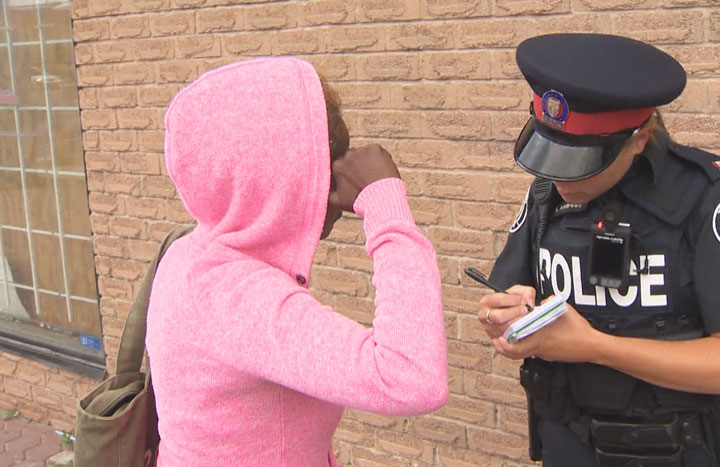TORONTO – Ontario has released its final regulations to ban police from randomly stopping people to collect personal information, a practice known as carding or street checks.

The regulations, which were first posted last October for public comment, set out what the government calls “clear and consistent rules” for voluntary police-public interactions.
Race is prohibited from being any part of a police officer’s reason for attempting to collect someone’s identifying information.
Starting Jan. 1, 2017, police must tell people they have a right not to talk with them, and refusing to co-operate or walking away cannot then be used as reasons to compel information.
READ MORE: Provincial ban on carding criticized by community activists and police
However, police can gather personal information during routine traffic stops, when someone is being arrested or detained, or when a search warrant is executed.
VIDEO: Provincial government outlines what rights citizens have in police ‘carding’ stops
The Liberal government said it wanted to ban arbitrary stops after hearing from too many people of colour and aboriginal men and women, who said the Human Rights Code was being ignored by police who stopped them for no apparent reason.

Get breaking National news
READ MORE: Mental health, carding records can’t be disclosed in police record checks in Ontario
Under the new regulations, police must offer a written record of any interactions with the public, including their name and badge number, along with information on how to contact the Independent Police Review Director.
All identifying information that is collected by officers will have to be submitted within 30 days for review by the local chief of police. At least once a year, the chiefs will have to conduct a detailed review of a random sample of entries in their database to verify it was collected in compliance with the regulation.
READ MORE: Coalition says Ontario’s carding regulation won’t prevent controversial practice
Chiefs must also issue an annual public report on the number of attempted collections of personal information, the sex, age and race of the individuals stopped, and the neighbourhoods where the information was collected.
VIDEO: Premier Wynne stops short of calling police carding racist

The government is also promising a roundtable of experts to advise the Ontario Police College on the development of new training for officers on racism, bias awareness and discrimination. It said all officers will be trained by Jan. 1.
- What’s the story behind this mysterious photo album dropped at Global Edmonton?
- Want to claim charitable donations on tax returns? Ottawa to extend deadline
- Canada Post strike left 215K passports in limbo – and more delays could come
- New Brunswick to issue roadside suspensions for impaired driving starting Jan. 1







Comments